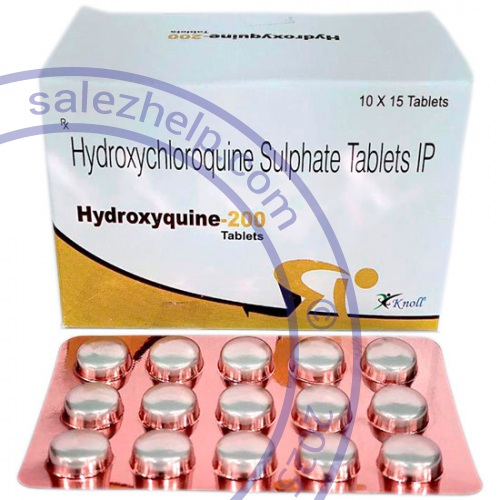Hydroxychloroquine Singapore
Hydroxychloroquine is a prescription medication primarily used to prevent or treat malaria caused by mosquito bites in countries where the disease is common. It belongs to a class of drugs known as antimalarials. Besides this, it is also used to treat rheumatoid arthritis, lupus and certain type of skin disorders. It works by killing parasites that cause malaria and reducing inflammation in the body. Despite some speculation, its effectiveness in treating COVID-19 is not proven and it's largely discouraged due to potential harmful side effects. Common side effects include nausea, vomiting, loss of appetite, diarrhea, dizziness, or headache.
- 200mg
- 400mg
1. **What is Hydroxychloroquine?**
Hydroxychloroquine is a prescription medicine used to prevent and treat malaria, a disease caused by parasites transmitted through mosquito bites. Besides malaria, it is also prescribed for specific autoimmune disorders such as lupus and rheumatoid arthritis. Hydroxychloroquine is classified as an antimalarial drug, working by killing the parasites.
2. **How does Hydroxychloroquine work in the body?**
Hydroxychloroquine is believed to work by interfering with the communication of cells in the immune system. It has properties that disrupt the functioning of parasites which cause malaria, effectively killing them. For autoimmune conditions, it suppresses the overactive immune response, reducing inflammation and its associated symptoms.
3. **Can Hydroxychloroquine be used to treat COVID-19?**
The use of hydroxychloroquine to treat COVID-19 has been a point of controversy. Early in the pandemic, some studies suggested it might be beneficial, but more recent, higher-quality research suggests it does not offer a significant benefit and may even carry serious risks, including heart problems.
4. **What are the potential side effects of Hydroxychloroquine?**
Common side effects include nausea, vomiting, diarrhea, stomach cramps, and headaches. Sometimes, it may cause blur vision, muscle weakness, mental/mood changes, severe dizziness, or ringing in the ears. Serious side effects are rare but include irregular heartbeat, mental confusion, seizures, severe stomach/abdominal pain, and suicidal thoughts.
5. **Are there precautions to take when using Hydroxychloroquine?**
People with existing conditions such as heart disease, liver disease, kidney disease, dermatitis, or a history of mental illness should discuss these with their doctor before using hydroxychloroquine. Patients should avoid excessive sunlight exposure and consider using sunblock as this drug can make the skin more sensitive to sunlight.
6. **Can pregnant women or nursing mothers take Hydroxychloroquine?**
Pregnant women and nursing mothers should consult their doctors before starting hydroxychloroquine. This drug may pose risks to the fetus. However, malaria itself is harmful to both the mother and fetus. The benefits of taking hydroxychloroquine may outweigh potential risks in some cases.
7. **Can Hydroxychloroquine be taken with other medications?**
Hydroxychloroquine may interact with other drugs, consequently altering their effectiveness or increasing side effects. Precautions should be taken while using Hydroxychloroquine with anti-seizure medications, blood thinners, certain antibiotics, and heart medications. Always inform your healthcare provider about all medications, supplements, or herbs you are currently taking.
8. **How should Hydroxychloroquine be stored and disposed of?**
Hydroxychloroquine should be stored in a cool and dry place, away from heat and moisture. It should not be disposed of via wastewater or household waste. Unused or expired medication should be returned to a pharmacy or a local collection point.
9. **What is the recommended dosage for Hydroxychloroquine?**
The dosage for Hydroxychloroquine varies based on the condition being treated and the patient's weight. For prevention of malaria, the common dosage is 400 mg once weekly. For treating conditions like rheumatoid arthritis or lupus, the typical dose is 200-400 mg daily. However, the doctor's advice should be followed carefully for dosage directions.
If you have additional queries or concerns about Hydroxychloroquine, ensure you speak to a healthcare professional for further advice. Always remember to only take medications as prescribed by your doctor.
What are known local names of the medication?
- Oxycodone Hydrochloride XR
- Dolquine
- Oxychlorochin
- Oxycodone Hydrochloride
- Oxycodone Hydrochloride IR
- Resochin
- Oxichloroquine
- Oxycodone Hydrochloride CR
- Quensyl
- HCQS
- Axemal
- Quineprox
- Quinoric
- Hydroquin
- Oxichlorochine
- Plaquenil
- Hydroquinone
- Oxycodone
- HCQ
- Oxycodone Hydrochloride SR



